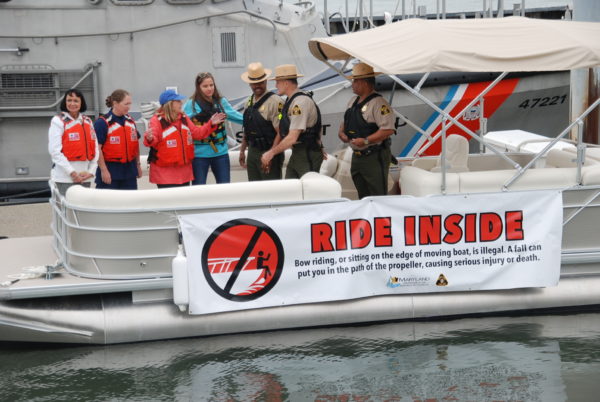Top 10 What ‘NOT TO DOs’ on a Pontoon

Safety is our absolute #1 concern with our rental fleet. We care more about sending pontoons out safely than we do about the number of rentals we get.
Below are the Top 10 What NOT To Dos on a boat. Read them. Understand it. If you have ANY questions, ask us. You can ask when you arrive or ask in advance by contacting us online.
- DO NOT stand or sit outside of the pontoon railings:
This is the MOST dangerous thing you can do on a pontoon. This also accounts for the most severe injuries and fatalities on a pontoon boat (other than drownings).
Stay INSIDE the pontoon railings at ALL times while the engine is on or when the pontoon is not at anchor. This includes when you are docking the boat or anchoring the boat. Do NOT have passengers outside the railings or hanging over the seats/railings while docking or anchoring.
Remember, the prop will still dangerously spin for 10-30 seconds after the engine is turned off.
2. DO NOT get in the water without a life jacket:
The number one way to insure your safety on a boat is to wear a life jacket. It is the law that anyone under the age of 13 HAS to have a life jacket on at all times. Anyone, regardless of age or swimming ability, needs to have a life jacket on when they exit the boat to go swimming.
3. DO NOT put your arms/legs between you and the dock:
You might think you can stop the boat with your arms. Don’t. You run the risk of breaking your arm. The boat, even moving slowly carries tremendous amount of weighted force behind it.
4. DO NOT start the engine until everyone is on board and seated:
There should be a secondary lookout on ALL boats. Part of this person’s task on board is to insure all guests are on board the boat and seated BEFORE the driver starts the motor. Before you leave the dock, make sure you nominate an adult to act as the secondary lookout.
5. DO NOT jump off a moving boat:
Everyone has seen Baywatch. Diving off the side of a moving boat is extremely dangerous and considered negligent behavior. The list of ways you can be hurt doing this is too long to list. Do not jump off a moving boat.
6. DO NOT dive into the lake:
Lake Wylie only has visibility a few feet into the water. You might think there is plenty of water to dive into but you do not know what hazards might be under the water that you can’t see. Always lower your body into the water using the boats boarding ladder.
7. DO NOT overload the boat:
Each pontoon boat is rated for a certain amount of weight on the boat. This weight limit includes passengers and any gear you bring on the boat (coolers etc). If you put more weight or passengers on the boat than it is rated for, you run the risk of damage and injury. Proper weight balance of the boat is important too. Do not have all the weight/passengers in the front of the boat or one side of the boat. The weight needs to be distributed evenly throughout the boat.
8. DO NOT operate the boat around people in the water:
Swimming in the lake is very popular. People swim off their docks, near the sand bars, and near the shorelines. It is your responsibility to keep a look out for people in the water. DO NOT operate the boat around people in the water. If you visit the sand bar, you need to keep a keen eye on everyone and make sure you are exiting the area extremely slowly and safely while keeping your boat away from other people in the water.
9. DO NOT operate the boat fast in congested areas:
Boats do not have breaks. They do not turn or stop on a dime. It is important you remember the old boating saying; “Never drive a boat faster than you are willing to crash into something”. If you follow that rule, you’ll be safe. This is especially important while docking the boat. The slower you go, the slower you’ll hit the dock. Remember SLOW IS SAFE!
10. DO NOT DRINK AND DRIVE:
We and the numerous law enforcement agencies have a ZERO tolerance for drinking and operating a boat. Recently laws have been changed to impose the same legal consequence for DUIs as a BUI (Boating Under the Influence). The driver MUST be sober. The driver MUST be 30 years or older to operate a rental boat.
If you remember these 10 things, you will be well on your way to a safe trip on the water. This is not an exhaustive list of safety concerns. Lake Wylie and boating in general has hazards you need to know about. Our staff will go over daily specific hazards (such as debris in the water or lake levels) during each safety briefing before you leave the dock.
